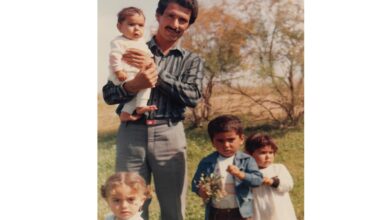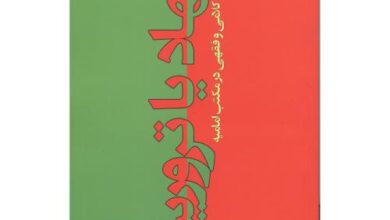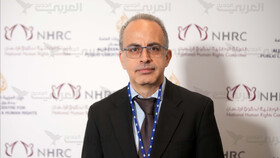The Association for Defending Victims of Terrorism, in cooperation with Yazd University, provincial institutions, the governor’s office, the Martyrs and Veterans Affairs Foundation and Yazd Municipality, organized a side-event to explain terrorism in the context of asylum and commemorate the martyrs of the Hafte Tir bombing. It was entitled “Asylum and Terrorism” on during the 50th session of the UN Human Rights Council attended by professors, lawyers, judges, officials and provincial figures, families of victims of terrorism and students of Yazd University in a hybrid format.
At the beginning of the event, Dr. Rafieian, Vice Chancellor for Social and Cultural Affairs of Yazd University, welcomed the audience and said, “The further we go, the clearer the legitimacy of the martyrs becomes.” He continued, “Terrorists, especially Hypocrites, assassinate character of a person before assassinating them. An example of which is Martyr Beheshti and the battle between good and evil is constant.”
“Asylum today is a tool for the continuation of terrorist activities, whether in cyberspace or in real space,” he said. Seventy years after the refugee conventions, terrorism is entrenched in the asylum context and carries out its terrorist acts in the form of character or physical terrorism.
Hojjatoleslam Zare, the head of the Foundation for Martyrs and Veterans of Yazd, said that the Hypocrites’ crimes have damaged the reputation of humanity. The Hypocrites killed many people under false pretexts. They even killed a child with a barrel full of hot water. And some of the martyrs were boiled in water and they died. He continued, “One day, the son of Martyr Pakenjad told me, ‘I just want to ask the terrorist who caused the Hafte Tit bombing and for what crime my father was martyred.’
The head of the Foundation for Martyrs and Veterans of Yazd continued, “The martyrs of the terrorism were each elites who could change the society.” Some examples are the martyrs of the Hafte Tir bombing, most of whom had higher education degrees from the most prestigious universities in the world, and their lack is very painful for the country.
In another part of the meeting, Seyyed Hashem Pakenjad, the son of the martyr Dr. Reza Pakenjad, one of the martyrs of the terrorist attack of Hafte Tir, said, “My father had a doctorate in medicine and my uncle Dr. Seyed Mohammad Pakenjad also had a doctorate in economics from Germany and was an employee of the Swiss Union Bank who had returned to serve in the country after the revolution.
Martyr Pakenjad’s son continued: “I must mention that the grandchildren of Martyr Pakenjad were also injured in another terrorist crime in 2012 in the Iraqi city of Samarra as a result of a suicide bombing.” And we, as a family affected by the two terrorist groups of the hypocrites and ISIS, sincerely hope that other people like us will not fall victim to terrorism and let this dirtiest human violence disappear from the scene of the times.
At the end of his speech, Seyed Hashem Pakenjad, as the representative of Shahid Pakenjad’s family, called on Western governments, especially the Netherlands and the United Nations, to hear the voice of justice for the victims of the Hafte Tir bombing and provide them with access to justice in the court of murderer Ali Motamed and publish the information gathered by the Dutch court regarding the terrorist background of the terrorist criminal to inform the public, especially the survivors of the Hafte Tir bombing. He added that the Dutch court is obliged to consider this murder different from other murders, and since the victim is a terrorist, it should do his best to clarify the terrorist background of Ali Motamed in order to uncover the secret of the murder and the Hafte Tir bombing.
Finally, he called on the European governments hosting the terrorists to apologize to all the families of the victims of terrorism in Iran.
Following the ceremony, Dr. Ashraf Boroujerdi, the wife of the martyr Dr. Gholam Ali Motamedi, told the story of her husband’s martyrdom and talked about the country’s economic problems and the succession of Bani Sadr. I went there that night with a relative. It was very difficult for families to see that scene. Some people were still alive under the rubble. This crime was carried out with a very strong plan and coordination, and Kolahi had planted this bomb there.
She went on to say, “What is the response of Western governments, especially the Dutch government, to the families of the martyrs of the Hafte Tir bombing?” Why, a few years later, the Dutch government, which claims human rights, still does not apologize to the families of the Hafte Tir bombing for this unforgivable violation, granting asylum to this terrorist criminal.
Dr. Boroujerdi, a member of the faculty of the Institute of Humanities, said, “We must plan and work to convey the unheard voice of the families of the martyrs of the Hafte Tir bombing.” We must reveal to the public the hidden truths of this terrorist attack. If they grant asylum status, we must also cry out for the martyrs of terrorism. I hope everyone steps on this path.
In another part of the meeting, Mr. Ali Akbar Azizi, Deputy Governor of Yazd, welcomed the families of the martyrs present at the meeting and said that terrorist groups are supported by the US government. There have been more than a hundred coups by Americans around the world. Some of these coups were done in Iran. And more than seventeen thousand martyrs have been assassinated by terrorists in Iran, seventy-two of them were killed in Hafte Tir bombing.
He continued 27 June was also the anniversary of the assassination of the Leader of the Revolution in AbouzarMosque. The 12th of Tir is the downing of an Iranian passenger plane in the Persian Gulf, which hit the passenger plane directly with a missile and later honored the commander of the Vincennes.
In another part of the meeting, Dr. Heibatullah Nejandi Manesh, a member of the faculty of Allameh Tabataba’i University, said about terrorism in the context of asylum, “We have never done basic legal work in the field of martyrs of terrorism in recent years and the pay the compensation for it. He continued, in the case of the martyrs of the Hafte Tir bombing, we should ask whether the Dutch government had a legal responsibility to shelter members of the terrorist group of Hypocrites. He added that according to international conventions, countries should not grant asylum to those suspected of crimes against peace.
The faculty member of Allameh Tabataba’i University continued, we must ask whether the Dutch government was aware of Ali Motamed’s background when he was granted asylum. We have to answer, naturally, whoever wants to enter the territory of a country, and those countries are aware of his identity. In this way, the Dutch government has violated international procedures and basically European countries do not ignore the law, but use terrorist groups as tools. Like the terrorist group of the Hypocrites, which the United States uses as a tool against the Islamic Republic after the invasion of Iraq, and thus removed them from the list of terrorist groups for political reasons.
Dr. Hiebatullah Nejandi Manesh continued, “Now we see that some European countries have become a museum for terrorist groups, and we even have to talk about proxy terrorism.” That is, countries use terrorist groups as a tool to achieve their own political goals. The Ph.D. Holder of international law, in another part of his speech, stated that in the debate of Ali Motamed, the Dutch government must be accountable within the framework of international obligations. The families of the martyrs of the Hafte Tir bombing cannot do anything alone, and the government must enter into this issue through the diplomatic and legal means contained in the UN Charter. He continued, families only seek to discover the truth and achieve the right to know their own truth. Ali Motamed is not an ordinary citizen and the presence of the logo of the terrorist group of Hypocrites on his tombstone and the title of martyr on it is a sign of his connection with the terrorist group of Hypocrites until his death and even in the grave and the Dutch government must be held accountable.
During the event, Dr. Amir Maghami, a faculty member of Yazd University, regarding granting asylum to terrorist criminals from the perspective of international law, stated that the concept of asylum was based on the fact that a person in his homeland for racial, political, religious and unjustly oppressed, persecuted and persecuted, he must be able to seek refuge in another government. Accordingly, Article 14 of the Universal Declaration of Human Rights states that everyone has the right to seek and to enjoy in other countries asylum status.
He added that, assuming he is entitled to asylum, governments may refuse to accept asylum seekers depending on their economic, political and social status. Article 14 of the Universal Declaration of Human Rights states that “This right cannot be exercised if it is non-political or acts contrary to the principles and intentions of the United Nations.” Terrorist crimes are among the crimes that are recognized as a public crime in most countries, and as stipulated in Article 11 of the Convention against Terrorist Bombing, these crimes cannot be motivated by political motives or identified as a political crime.
In another part of the meeting, the professor of Yazd University stated that in connection with the situation of Ali Motamed (Mohammad Reza Kolahi), it seems that the Dutch government has made three serious mistakes in granting asylum. First, there has been no discriminatory prosecution against him in Iran in order to justify fears in the definition of the Refugee Status Convention. Second, perpetrators of terrorist crimes, like other public crimes, cannot obtain refugee status and must be held accountable first and foremost for their crimes. Third, the Dutch government has had the legal authority to try such a defendant since at least 2002, when it acceded to the Convention for the Suppression of Terrorist Bombings, and there is no reason why the jurisdiction and obligation to try or extradite him was not done while it was a formal rule of thumb. Dealing with impunity for such crimes should be retroactive.
He added that the Iranian government, in accordance with Article 38 of the Convention on the Status of Refugees, had the opportunity to challenge the Dutch government’s decision to grant asylum to a terrorist accused in the International Court of Justice, thereby raising the voices of the victims in the world
In another part of the meeting, Dr. Seyed Mohsen Hekmati Moghaddam, Professor of International Law, on the issue of granting asylum to terrorist perpetrators and the structural weakening of human rights, said that in some cases, such as insecurity in the world, we see terrorism abuse of asylum and terrorists with the use of asylum seeks to escape the punishment of their terrorist acts.
He continued, “Unfortunately, due to the lack of a dominant force in the world, the implementation of international conventions, such as human rights structures, depends on the will of governments, and it is the governments that must deal with violations of international conventions by themselves.”
Then Dr. Ali Zare, Chief Justice of Ardakan, Yazd, regarding the largest terrorism case in the world in the context of terrorism said that the presence of the terrorist group of Hypocrites in France for years is a clear sign of Western support for terrorism in the context of asylum. The cry of protest against this current of support rose not only from the victims of the crimes of this terrorist sect, but also from inside of France, but did not reach anywhere. The Chief Justice of Yazd, Ardakan, said that in only one case in 2003 did the French government fail to crack down on the terrorist group, and on 17 June 2003, French police, on the orders of the country’s anti-terrorism judge, Jean-Louis Brugier, A large-scale operation involving 1,300 police officers attacked 13 bases of the hypocritical group and arrested 165 members of the terrorist group, confiscating millions of dollars along with documents related to the criminal activities of this terrorist group. “The attack was carried out because of criminal connections, to carry out terrorist operations and to finance terrorist activities,” the French Interior Ministry quoted Judge Jean-Louis Brugier as saying. “The organization has operational, organizational and logistical bases in Paris to raise suspicious money.”
He concluded: “After many years, it is still unclear why this case did not reach the desired result and the French court ruled in favor of Maryam Rajavi.” Why does a terrorist group in the country claiming human rights have large centers in the refugee camp to plan, support and assist terrorist acts, and despite the knowledge of the French government, the judicial actions of judges such as Jean-Louis Brugier have failed? Is not this the failure of international law in the fight against terrorism? Another example is the presence of hundreds of terrorists from all over Europe and the United States at the group’s headquarters in Iraq, who have carried out terrorist acts. They were either killed or buried in Ashraf, or they returned to European countries with a heavy terrorist record as refugees.
In the final part of the meeting, the families of the martyrs of terrorism were honored and the statement of the Association for Defending Victims of Terrorism entitled “The first case of terrorism in the context of asylum” was read.





